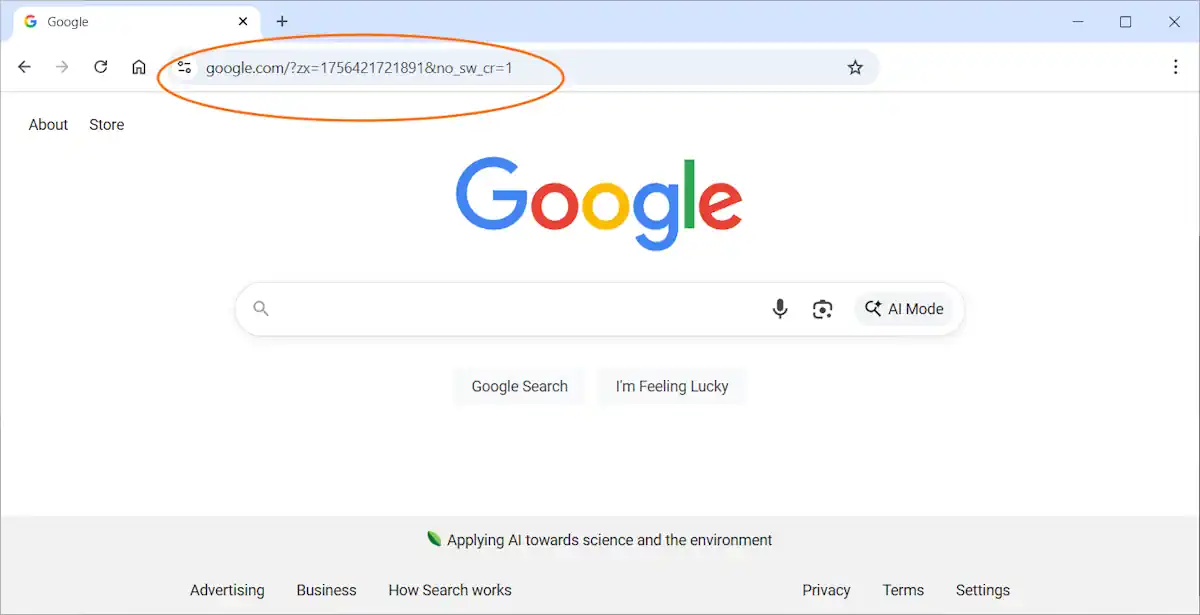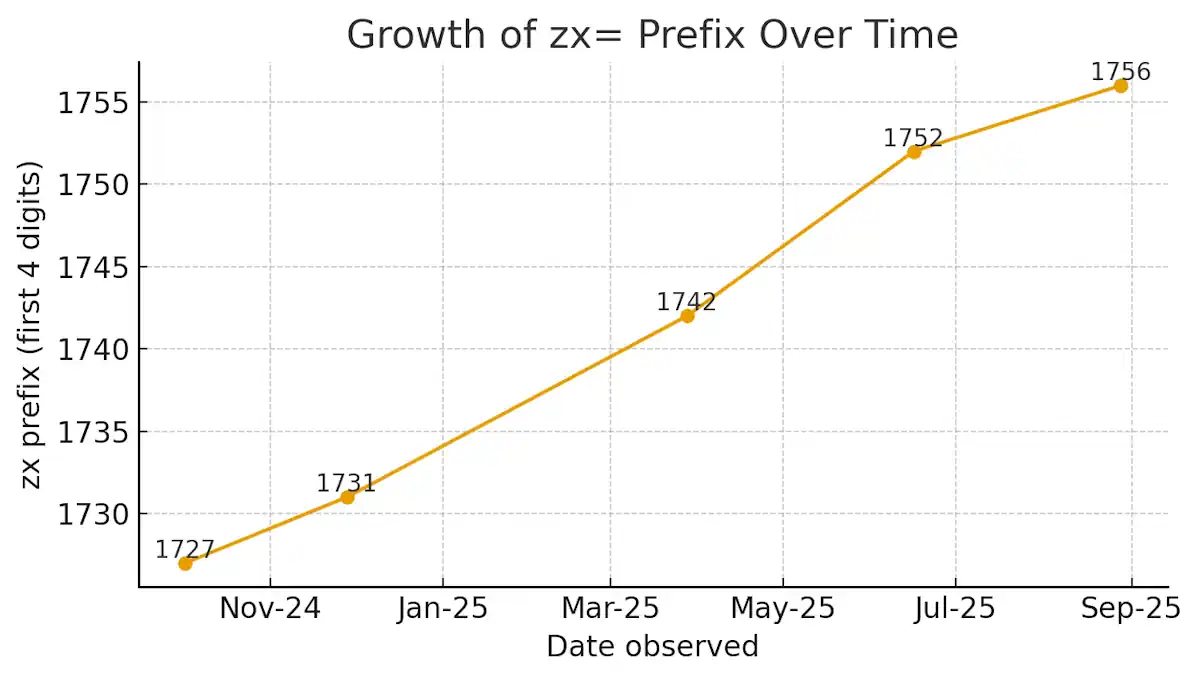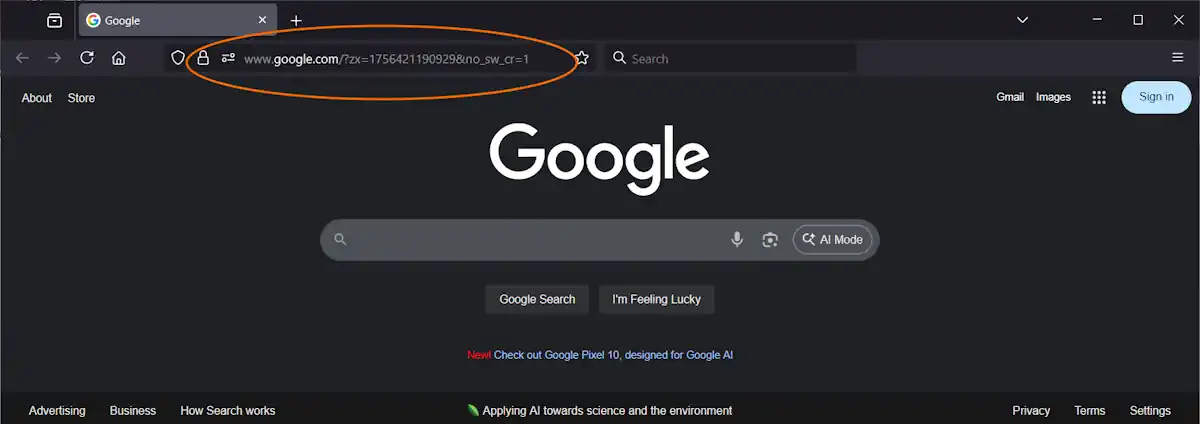Many people have seen a strange change in the Google.com URL. When you type google.com, the page often redirects to a longer address. The new link includes `?zx=[number]&no_sw_cr=1`.
At first this looks like malware. The string of numbers seems random, and the page looks less safe. Some users worry that Google is tracking them in secret. Others find that it breaks the search bar, because their typed words get mixed with the extra code.
Here is what you need. Click here for a guide on how to update your browser to avoid the annoying code:
Google has not given a clear answer. In Google support forums, they lock questions and mark them as “non-issue.” That silence makes it evident that Google is hiding something.

In this article, we explain what these parameters mean. We look at tests that show how they change over time. And we share what you can do about it, even if no perfect fix exists today.
What the Parameters Mean
The `zx=` value
The part after `zx=` is a long number, usually 13 to 15 digits. It changes every time you load the page. At first it looks like random noise. But tests show the number always goes up. That makes it work like a counter or a timestamp. It is not tied to your Google account, but it gives each request a unique mark.
The `no_sw_cr=1` value
The second part, `no_sw_cr=1`, has been known since 2019. A German SEO site found it when testing mobile search. The value tells Google to ignore cached results and show a fresh page. For search testers this is useful. For normal users, it only looks strange and adds confusion.

Why It Feels Like Tracking
To the average user, these codes look like malware. A page with random digits in the URL feels unsafe. It looks like some virus has injected itself into the browser.
The change also interferes with search. When people type words in the URL bar, the query mixes with the code. That often leads to failed searches. Removing the extra part is hard, because it takes awkward key presses or a mouse cut.
Google’s response makes the problem worse. By closing threads without clear answers, the company looks like it is hiding something. This silence fits with the common fear of a Big Brother style of surveillance.
Even if the values are not directly tied to advertising IDs, they still behave like tracking. Each request is marked with a unique and rising number. That is enough to raise suspicion.
Community Reports
People have discussed this issue across many forums. On Reddit, users report it on Chrome, Firefox, and Edge. Some see it on Android phones, others on Linux or Mac. VPN use does not stop it. Extensions like uBlock Origin and Privacy Badger make no difference.
On the Brave Community forum, people first thought the browser was adding it. Other users confirmed it was Google, not Brave.
In official Google Chrome forums, threads are marked as “informational only.” Replies are locked, and no technical notes are given.
In short, the behavior is not limited to one browser or device. It comes directly from Google servers.
Time Analysis of the zx Number
At first the `zx` number looks random. But when you collect samples, you see a pattern. The number never goes down. It always climbs higher, even across different days and months.
The prefix — the first four digits — changes slowly over time. For example, in October 2024 it was around 1727. By March 2025 it had risen to 1742. By late August 2025 it was around 1756. That is an increase of about 2 to 3 units per month.
The rest of the digits climb much faster. In tests, values taken 10 seconds apart rise by 15,000 to 30,000. That is roughly 1,500 to 3,000 per second. The rate is not constant, but the growth is steady.
This means the `zx` number is like a timestamp, but not a standard one like Unix time. Instead it seems to be a hybrid. The first digits track days or months. The last digits act like a fast counter, climbing thousands per second.
This makes sense if it is a live counter on the Google side. Each request would get a number from that clock. It prevents caching, and it gives every request a unique tag.
To the user, this looks like tracking. Even if it is “just” an internal counter, it still means that every search request can be logged with millisecond detail.

What You Can Do About It
There is no known way to stop Google from adding `zx` and `no_sw_cr=1`. Extensions like uBlock Origin or Redirector cannot erase it, because Google re-adds it after every load. But there are some workarounds you can try.
Chrome and Edge
In Chrome and Edge, go to chrome://settings/searchEngines. Check that your default search engine URL is clean. It should be https://www.google.com/search?q=%s.
Some users report that reinstalling or resetting the browser clears the issue for a while. If not, you can switch to Startpage or DuckDuckGo.
Firefox
In Firefox, you can add a separate search bar to the toolbar. This keeps your typing separate from the URL bar. It does not stop the `zx` parameter, but it avoids broken queries.
If the behavior bothers you too much, the best option is to change the default search engine to something other than Google.
Brave
On Brave, the same thing happens. Users first thought Brave added it, but later confirmed it was Google. You can make a custom search engine in settings, or switch to Brave Search, which is built in and more private.
Safari
Safari users also see the extra parameters when using Google. There is no known fix. The only real option is to change your default search provider.
Universal Note
So far, no one has found a way to stop these parameters. They are added on Google’s servers, not in your browser.
If you have found a method that works, please share it in the comments. We will update this article with your input.

FAQ
Q: Is the `zx` number unique to me?
A: No. It is not tied to your account. Tests show it always increases with time, like a shared counter.
Q: Is it a timestamp?
A: Yes, in a way. The first digits rise slowly, about 2–3 units per month. The rest of the digits rise thousands per second. It works like a hybrid clock and counter.
Q: Does it leak my privacy?
A: Not directly. But it does act as a unique marker for each request. Combined with other data, it could help track your activity.

Conclusion
Google has not stated what `zx` and `no_sw_cr=1` are doing in your browser. They close support threads with no explanation. We are to assume they are harmless. But to users, the reality looks different. The numbers act like timestamps. They tag each request with unique data. They interfere with fast searching and make Google look like a virus.
Even if this is “just” internal cache control, Google’s suppressing the support requests makes it worse. By hiding how it works, the company creates the impression of tracking in plain sight. Until Google explains, users are left to guess. And in an age where trust in big tech is low, that is not a good look.